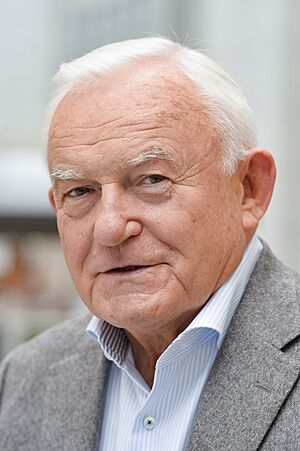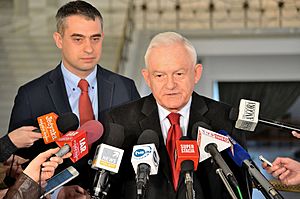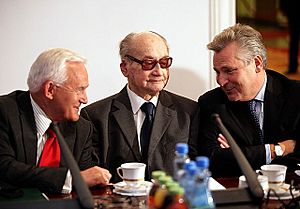Leszek Miller facts for kids
Quick facts for kids
Leszek Miller
|
|
|---|---|
 |
|
| Prime Minister of Poland | |
| In office 19 October 2001 – 2 May 2004 |
|
| President | Aleksander Kwaśniewski |
| Deputy | Marek Belka Jarosław Kalinowski Marek Pol Jerzy Hausner Józef Oleksy |
| Preceded by | Jerzy Buzek |
| Succeeded by | Marek Belka |
| Leader of the Democratic Left Alliance | |
| In office 10 December 2011 – 23 January 2016 |
|
| Preceded by | Grzegorz Napieralski |
| Succeeded by | Włodzimierz Czarzasty |
| In office 15 April 1999 – 6 March 2004 |
|
| Preceded by | Position established |
| Succeeded by | Krzysztof Janik |
| Leader of the Polish Left | |
| In office 5 January 2008 – 9 January 2010 |
|
| Preceded by | Position established Himself (As Leader of Social Democracy) |
| Succeeded by | Jacek Zdrojewski |
| Leader of Social Democracy of the Republic of Poland | |
| In office 21 September 1997 – 15 April 1999 |
|
| Preceded by | Józef Oleksy |
| Succeeded by | Position abolished Himself (As Leader of the Democratic Left Alliance) |
| Minister of Interior and Administration | |
| In office 1 January 1997 – 31 October 1997 |
|
| Prime Minister | Włodzimierz Cimoszewicz |
| Preceded by | Zbigniew Siemiątkowski |
| Succeeded by | Janusz Tomaszewski |
| Minister of Labour and Social Policy | |
| In office 26 October 1993 – 7 February 1996 |
|
| Prime Minister | Waldemar Pawlak Józef Oleksy |
| Preceded by | Jacek Kuroń |
| Succeeded by | Andrzej Bądkowski |
| Member of the Sejm, I, II, III, IV and VII | |
| In office 25 November 1991 – 18 October 2005 |
|
| In office 8 November 2011 – 11 November 2015 |
|
| Personal details | |
| Born |
Leszek Cezary Miller
3 July 1946 Żyrardów, Poland |
| Political party | Polish United Workers' Party (1969–1990) Social Democracy of the Republic of Poland (1990–1999) Democratic Left Alliance (1999–2007, 2010–2021) Polish Left (2007–2010) |
| Other political affiliations |
Self-Defence of the Republic of Poland (2007) |
| Spouse | Aleksandra Miller |
| Children | 1 |
| Awards | |
| Signature |  |
Leszek Cezary Miller (born 3 July 1946) is a Polish politician. He served as the prime minister of Poland from 2001 to 2004. He was also a member of the European Parliament from 2019 to 2024.
From 1989 to 1990, Miller was part of the Politburo of the Polish United Workers' Party. He led the Democratic Left Alliance twice, first from 1999 to 2004, and again from 2011 to 2016.
Contents
Early Life and Education
Leszek Miller was born in Żyrardów, Poland, on July 3, 1946. He grew up in a family that did not have much money. His father was a tailor, and his mother worked as a needlewoman. His parents separated when he was very young. His mother raised him, and he even served as an altar server in their church for a time.
Because life was difficult, Miller started working at a textile factory in Żyrardów when he was 17. He also continued his education in the evenings. He later completed his military service on a submarine called ORP Bielik.
Political Journey
Starting in Politics (Before 1990)
Leszek Miller began his political journey as an activist in the Socialist Youth Union. He quickly became a leader in his local area. In 1969, he joined the Polish United Workers' Party (PZPR). This was the main communist party in Poland at the time.
Miller used his connection with the party to help him with his studies and career. In 1973 and 1974, he was a secretary for the PZPR. The party recommended him for political science studies, and he graduated in 1977. After finishing his studies, Miller worked for the PZPR Central Committee. He oversaw departments related to youth, sports, and tourism.
In 1986, Miller became the First Secretary of the PZPR in Skierniewice. In 1988, he moved back to Warsaw after being promoted. He took part in the important "Round Table" talks in 1989. These talks helped lead to big changes in Poland. In 1989, he also became a member of the PZPR Political Bureau.
After 1990: A New Era
After the PZPR was no longer active, Miller helped create the Social Democracy of the Polish Republic party. He held important roles in this new party, including its chairman. In 1999, he was elected chairman of the Democratic Left Alliance (SLD). He held this position until 2004.
In 1991, Miller was elected to the Sejm, which is the Polish Parliament. He represented the city of Łódź. He continued to win elections and served in Parliament until 2005.
Throughout the 1990s, he was a leading politician on the left side of Polish politics. He served as the Minister of Labour and Social Policy from 1993 to 1996. He also became the Minister of Internal Affairs and Administration in 1997. Miller played a key role in bringing together many left-wing groups. This led to the creation of the Democratic Left Alliance, which became very successful.
Leading Poland: Prime Minister (2001-2004)
In the 2001 parliamentary election, the Democratic Left Alliance won by a large margin. On October 19, 2001, President Aleksander Kwaśniewski appointed Leszek Miller as the Prime Minister. His government, which had 16 members, was the smallest in Poland's history.
Miller's government faced tough economic challenges. These included high unemployment and a lot of public debt. However, by the end of his term, Poland's economy started to grow faster. His government also worked on reforms for the tax system and social insurance.
A major goal of Miller's government was to help Poland join the European Union. They worked hard on the negotiations for Poland to become a member. On December 13, 2002, Prime Minister Miller successfully finished these talks with the European Union. On April 16, 2003, he signed the Accession Treaty in Athens. This was a very important step for Poland.
Miller's government also organized a national vote, called a referendum, for people to decide on joining the EU. On June 7 and 8, 2003, a large majority of Poles voted in favor of joining. This showed strong support for the decision.
In March 2003, Miller's government decided to send Polish troops to Iraq. This was part of an international effort. Miller also signed a letter with seven other European prime ministers. This letter supported the United States' position on Iraq.
On December 4, 2003, Leszek Miller was injured in a helicopter crash near Warsaw. He recovered from his injuries.
Towards the end of his time as Prime Minister, public support for his government was low. This was due to ongoing high unemployment and some corruption scandals. In February 2004, Miller stepped down as the head of his party. On May 2, 2004, one day after Poland officially joined the European Union, Miller resigned as Prime Minister. He was in Dublin on May 1, 2004, celebrating Poland's entry into the EU.
After Being Prime Minister
After leaving the Prime Minister's office in 2004, Leszek Miller continued to be involved in public life. In 2005, he was not re-elected to Parliament. He then started writing for a weekly magazine, sharing his thoughts on economic and political topics.
In 2007, Miller joined the Samoobrona party for a short time. In January 2008, he became the chairman of the newly formed Polish Left party. However, in December 2009, he decided to rejoin the Democratic Left Alliance (SLD). He became a columnist for a newspaper in 2010.
In the 2015 elections, he was not re-elected as a Member of Parliament. He also did not run for re-election as the chairman of the SLD in 2016. In March 2021, he announced that he was leaving the party after it merged with another group to form the New Left.
Personal Life
In 1969, Leszek Miller married Aleksandra. They had one son, Leszek Junior, who passed away in August 2018. He also has a granddaughter named Monika.
See also
 In Spanish: Leszek Miller para niños
In Spanish: Leszek Miller para niños
 | William Lucy |
 | Charles Hayes |
 | Cleveland Robinson |



